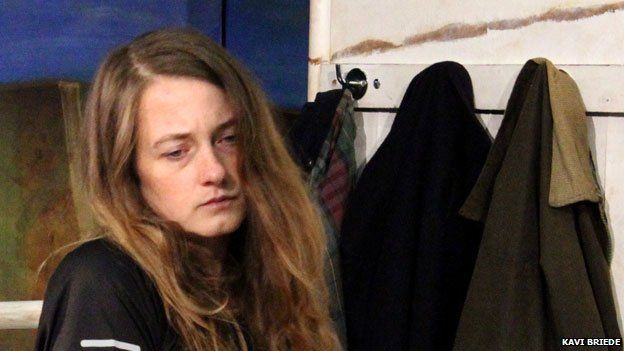Deaf actress's journey from single mother to leading lady
- Published

Sophie Stone was a young deaf single mother when she won a place at the Royal Academy of Dramatic Art, and is now getting recognition for her theatre and TV work.
About to start a tour in the UK, Sophie Stone is the lead actress in a new play Woman of Flowers. The production features a mixture of spoken and visual language, which echoes Stone's own confusing journey in communication as a deaf person.
Disabled playwright Kaite O'Reilly created the play with Stone in mind. Based on a Welsh myth, Woman of Flowers uses music, movement, speech and a sign-like visual language to tell the story of a farmer's wife who has forgotten her past but wants a different future to the one chosen for her by her husband and his uncle.
Looking back at Stone's own past, it might be considered surprising she's ended up doing what she does now.
It's been 10 years since, as a 24-year-old single mother living in East London, she became the first deaf person to study at Rada.
Stone has since performed at the National Theatre and with Deafinitely Theatre company, and has appearances in TV's Midsummer Murders, Casualty and Marchlands under her belt.
She says she developed the ability to communicate later than most and didn't start to express herself properly until joining a local drama club.
"I was a very frustrated, repressed and angry child, who couldn't articulate thoughts and feelings," she says.
She says that facial expressions, breath, touch and relationships with others on stage helped her release those tensions. From that point, she began to talk and use words. "I loved the feeling of words in my mouth, learning how to say them and how to affect people with them." On stage she now revels in the ability to connect and tell stories to others.
With echoes of Stone's own childhood language difficulties, Woman of Flowers doesn't use sign language or English exclusively. Most lines are spoken but Stone's character Rose's internal monologues are delivered physically using movement and theatricalised sign - a dramatic form of physical expression based on British Sign Language. The play is surtitled throughout, with the dialogue displayed on a screen close to the stage.
Stone's language journey began in what deaf people refer to as the "oral tradition", using lip-reading and spoken English as her main medium of communication. Born into a hearing family and educated in English, she didn't use sign language much until she started at a boarding school for deaf children. Here, she says she met an incredible crowd who she fell in love with: "I felt like I was finally understood and I was in a place where people got me."
Stone believes she now has a sense of the power of both worlds though doesn't always fit in to one or the other.
At 19, she had a baby daughter, Angel. She says that she felt very lost around the time of her pregnancy and didn't know who she was: "There was a general feeling from everybody around me that I was doomed and that my future had been taken away before it had even started. During the nine months of being pregnant I made the conscious decision not to live up to anybody's expectations, and to be exactly what I wanted to be."
She says she put all of her focus into being a mother until her daughter started at nursery then she had space to think.
"Theatre was my love and I wanted to go back into acting so I asked my mother if she would support me. She helped me with childcare and has been absolutely incredible, a real hero. Juggling it all was crazy but I wouldn't change it for the world. It made me and my daughter stronger, a real partnership. She allows me to be me."
At almost 15, Angel already knows she wants to direct films. "So I'll be in front of the camera and she'll be behind it," says Stone.
Woman of Flowers tours the UK until 1 November 2014.
Follow @BBCOuch on Twitter and on Facebook, and listen to our monthly talk show